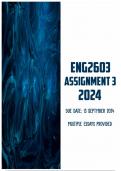Exam (elaborations)
ENG2603 Assignment 3 2024 | Due 13 September 2024
- Institution
- University Of South Africa (Unisa)
ENG2603 Assignment 3 2024 | Due 13 September 2024. Multiple essays provided Question 1: Welcome to our Hillbrow by Mpe Phaswane In Welcome to Our Hilbrow, Refentše is depicted as a creative writer who notes a problem with the suppression of writing literature in African languages. In one of t...
[Show more]



